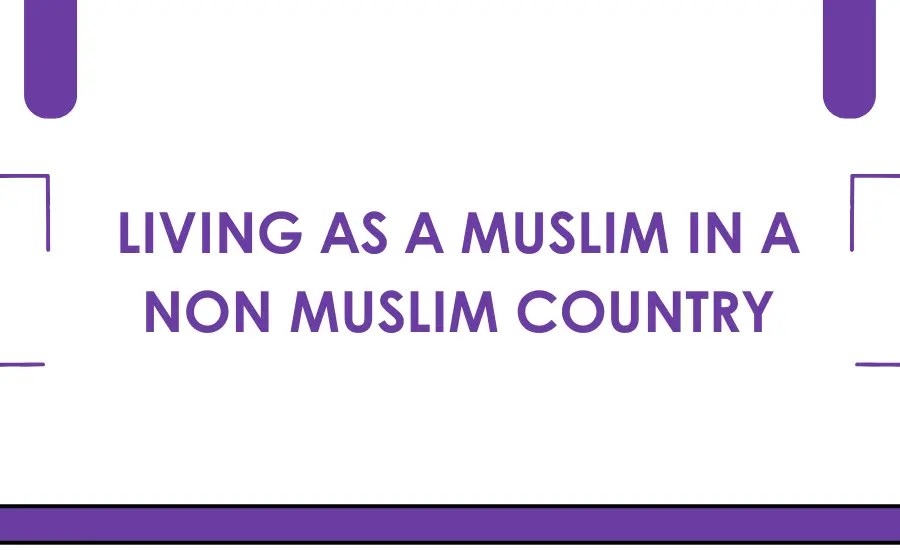Living as a Muslim in a non-Muslim country such as USA, UK, Australia, China, and European nations comes with unique challenges, responsibilities, and opportunities. It is a test of faith, patience, and resilience, but also a chance to demonstrate the beauty of Islam through character, knowledge, and action. Muslims abroad must navigate environments where Islamic values may not be widely understood or practiced, yet they are called to uphold their identity, observe religious obligations, and raise families in accordance with Allah’s guidance.
The Quran reminds believers that Islam is universal and for all of humanity, not limited to a specific land or culture:
قُلْ يَا أَيُّهَا النَّاسُ إِنِّي رَسُولُ اللَّهِ إِلَيْكُمْ جَمِيعًا
Transliteration: Qul ya ayyuhan nas inni rasulullahi ilaykum jami’an
Translation: “Say, O mankind, indeed I am the Messenger of Allah to you all.” – (Surah Al-A’raf 7:158)
This verse emphasizes that no matter where a Muslim lives, their mission remains the same: to worship Allah, act righteously, and serve as a living example of faith and morality. Living in a society with different beliefs or lifestyles can sometimes feel isolating, but it also offers an opportunity for spiritual growth, dawah through action, and the development of a strong, resilient Muslim identity.
In this blog, we will explore the challenges of living as a Muslim in non-Muslim countries, practical strategies to maintain faith, how to raise children with strong Islamic values, and the immense rewards for remaining steadfast in your deen.
Understanding Your Purpose as a Muslim Abroad
Wherever a Muslim lives, the purpose remains the same, to worship Allah, obey His commands, and live according to His guidance. Living in a non-Muslim country does not change your ultimate goal.
وَمَا خَلَقْتُ الْجِنَّ وَالْإِنسَ إِلَّا لِيَعْبُدُونِ
Transliteration: Wa ma khalaqtul jinna wal insa illa liya’budun
Translation: “And I did not create the jinn and mankind except to worship Me.” – (Surah Adh-Dhariyat 51:56)
This ayah reminds Muslims that even in environments where Islamic values are not dominant, their primary mission i.e. worshipping Allah, remains unchanged.
Challenges Faced by Muslims in Non-Muslim Societies
Living as a minority presents various challenges. Some of the major ones include:
a. Maintaining Islamic Identity
Muslims often face pressure to blend in or compromise religious practices to fit into secular cultures. Holding firmly to one’s Islamic identity is a form of jihad (struggle) in itself. The Prophet Muhammad (peace be upon him) said:
“Islam began as something strange and will return to being strange as it began, so glad tidings to the strangers.” – (Sahih Muslim 145)
b. Preserving Modesty and Morality
In societies where immorality and liberal ideologies are common, guarding one’s eyes, dress, and behavior becomes more difficult. Yet, Allah commands:
قُل لِّلْمُؤْمِنِينَ يَغُضُّوا مِنْ أَبْصَارِهِمْ
Transliteration: Qul lil mu’mineena yaghuddu min absarihim
Translation: “Tell the believing men to lower their gaze…” – (Surah An-Nur 24:30)
c. Access to Halal Lifestyle
Finding halal food, avoiding interest-based systems, and locating mosques can be difficult. However, with effort, intention, and community cooperation, Muslims can create halal-friendly environments even abroad.
How to Maintain Faith and Islamic Practice
Maintaining faith requires consistency and intention. Prioritize daily prayers, recite the Quran regularly, and engage in dhikr (remembrance of Allah) to strengthen your connection with Him. Surround yourself with a supportive Muslim community and seek knowledge to navigate challenges confidently while living in a non-Muslim environment.
a. Establish Regular Salah
Prayer is the foundation of Islam. It keeps a Muslim connected to Allah, even in foreign lands.
إِنَّ الصَّلَاةَ تَنْهَىٰ عَنِ الْفَحْشَاءِ وَالْمُنكَرِ
Transliteration: Inna as-salata tanha anil fahshai wal munkar
Translation: “Indeed, prayer prevents from immorality and wrongdoing.” (Surah Al-Ankabut 29:45)
Establish prayer on time, find local mosques, or create prayer spaces at work or school.
b. Build and Support Muslim Communities
Joining Islamic centers and connecting with fellow Muslims strengthens faith. Collective worship and study circles (halaqahs) create a sense of belonging. The Prophet (peace be upon him) said:
“The hand of Allah is with the group.” – (Tirmidhi 2166)
c. Learn and Teach Islam
When living in a non-Muslim country, knowledge becomes the shield of faith. Attend Islamic lectures, read authentic books, and teach your children Islam from an early age.
Being a Positive Representative of Islam
Muslims are ambassadors of Islam wherever they go. Through good character, honesty, and compassion, they can spread the message of Islam far better than words alone. The Prophet (peace be upon him) said:
“The most beloved of you to me are those who have the best manners.” – (Bukhari 6029)
Simple actions like greeting with peace, helping neighbors, and showing respect reflect Islamic values beautifully.
وَقُولُوا لِلنَّاسِ حُسْنًا
Transliteration: Wa qulu linnasi husna
Translation: “And speak to people kindly.” – (Surah Al-Baqarah 2:83)
Avoiding Assimilation and Shirk
While integration in society is permissible, assimilation that leads to compromising faith is not. Muslims must not imitate un-Islamic customs or participate in shirk-related practices (like celebrating pagan or religious holidays of others). The Prophet Muhammad (peace be upon him) warned:
“Whoever imitates a people is one of them.” – (Abu Dawood 4031)
Maintaining Islamic boundaries is crucial to preserving identity and avoiding hidden forms of shirk and moral compromise.
Raising Muslim Children in Non-Muslim Countries
Parents carry a heavy responsibility. Children may face confusion about identity, peer pressure, or secular education. To protect them:
- Establish strong Islamic education at home.
- Enroll them in weekend madrasahs or Islamic schools.
- Teach them pride in their Muslim identity.
- Encourage them to practice modesty, respect, and sincerity.
As the Quran instructs:
يَا أَيُّهَا الَّذِينَ آمَنُوا قُوا أَنفُسَكُمْ وَأَهْلِيكُمْ نَارًا
Transliteration: Ya ayyuhalladhina amanu qu anfusakum wa ahlikum nara
Translation: “O you who believe! Protect yourselves and your families from a Fire…” – (Surah At-Tahrim 66:6)
The Rewards of Remaining Steadfast
Remaining firm upon Islam in a non-Muslim country brings immense reward. Every act of worship, every struggle, and every sacrifice for the sake of Allah is multiplied. The Prophet (peace be upon him) said:
“Ahead of you are days of patience. The one who holds fast to his religion during that time will have the reward of fifty men.” – (Abu Dawood 4341)
Living Islam truly, despite difficulty, is a mark of sincerity and love for Allah.
Dawah: Sharing Islam with Wisdom
Living among non-Muslims provides the opportunity for dawah, inviting others to the truth. However, dawah must be done with wisdom, gentleness, and good manners.
ادْعُ إِلَىٰ سَبِيلِ رَبِّكَ بِالْحِكْمَةِ وَالْمَوْعِظَةِ الْحَسَنَةِ
Transliteration: Ud’u ila sabeeli rabbika bil hikmati wal maw’izatil hasanah
Translation: “Invite to the way of your Lord with wisdom and good instruction.” – (Surah An-Nahl 16:125)
Even small acts like being honest, kind, and humble can attract hearts toward Islam more effectively than debates or arguments.
Common Mistakes Muslims Should Avoid in Non-Muslim Countries
Being aware of common mistakes helps Muslims stay firm in their faith. Avoid neglecting prayers, compromising on halal practices, or blindly assimilating into un-Islamic cultural norms. Strengthen your iman through knowledge, community support, and consistent worship to overcome the challenges of living abroad.
1. Neglecting Salah (Prayer)
Skipping prayers due to work, school, or social pressure is a major mistake. Salah is the foundation of faith, and missing it weakens one’s spiritual connection. Always plan your day to perform prayers on time, even if it means using breaks or creating private prayer spaces.
2. Losing Islamic Identity
Trying too hard to “fit in” with secular culture can lead to compromising Islamic values, dress, and behavior. Maintaining modesty, halal practices, and honesty is essential. Remember the Prophet (peace be upon him) said:
“Islam began as something strange and will return to being strange as it began, so glad tidings to the strangers.” – (Sahih Muslim 145)
3. Neglecting Quran and Islamic Knowledge
Ignoring Quran recitation, study circles, and learning Islamic principles leads to weak faith. Regular study strengthens iman, helps with challenges abroad, and enables proper guidance for children and community.
4. Associating Too Little with the Muslim Community
Isolation can lead to confusion, doubt, and vulnerability to negative influences. Building a support network with other Muslims through mosques, Islamic centers, and online groups is vital.
5. Compromising on Halal Lifestyle
Eating haram food, dealing with interest-based banking, or participating in un-Islamic activities can slowly erode faith. Always verify halal sources, seek Islamic alternatives, and educate family members about permissible practices.
6. Blind Assimilation into Non-Islamic Culture
Adopting un-Islamic customs, festivals, or practices without understanding their religious implications may lead to subtle forms of shirk or moral compromise. Muslims must integrate respectfully but not imitate religious rituals of others.
7. Failing to Educate Children Properly
Leaving children to learn Islam only from schools or society exposes them to conflicting values. Parents must actively teach Quran, prayer, modesty, and moral ethics at home.
8. Reacting Negatively to Criticism or Islamophobia
Responding with anger, hostility, or withdrawal harms both personal faith and public image of Islam. Patience, knowledge, and good manners reflect true Islamic values:
وَقُولُوا لِلنَّاسِ حُسْنًا
Transliteration: Wa qulu linnasi husna
Translation: “And speak to people kindly.” (Surah Al-Baqarah 2:83)
9. Ignoring Opportunities for Dawah
Living among non-Muslims is a chance to show the beauty of Islam. Failing to set a good example through character, honesty, and helpfulness is a missed opportunity. Even small actions can attract hearts toward faith.
10. Losing Hope or Patience
Challenges abroad can make Muslims feel isolated or disheartened. Forgetting that trials are a source of reward is a common mistake. Patience and perseverance are key to spiritual growth and divine reward:
“Ahead of you are days of patience. The one who holds fast to his religion during that time will have the reward of fifty men.” – (Abu Dawood 4341)
Conclusion: Be a Light of Islam Wherever You Are
Living as a Muslim in a non-Muslim country is a test, a responsibility, and an honor. It demands patience, knowledge, and constant connection to Allah. Through strong faith, good manners, and active engagement, Muslims can thrive spiritually and contribute positively to their societies without compromising their deen.
اللهم ثبت قلوبنا على دينك
Transliteration: Allahumma thabbit qulubana ala deenik
Translation: “O Allah, keep our hearts firm upon Your religion.”
May Allah keep all Muslims firm upon His path and make them sources of light and guidance wherever they reside.
FAQs: Living as a Muslim in a Non-Muslim Country
How can Muslims maintain their Islamic identity in a non-Muslim country?
Muslims should prioritize daily prayers, read Quran regularly, attend local mosques or Islamic centers, dress modestly, and avoid participating in practices against Islam. Building connections with other Muslims and educating oneself about Islam also helps preserve identity.
Is it permissible to live in a non-Muslim country?
Yes, Islam allows Muslims to live in non-Muslim countries for work, education, or safety, as long as they can practice their religion and avoid forbidden acts. The key is to maintain faith and follow Islamic principles.
How can Muslims find halal food and lifestyle options abroad?
Muslims can seek halal-certified groceries, restaurants, and butcher shops. Online platforms and local Muslim communities often provide guidance. Planning ahead and preparing home-cooked meals is also a practical approach.
How should Muslim children be raised in non-Muslim countries?
Parents should teach Quran, prayer, and Islamic morals at home, enroll children in Islamic schools or weekend madrasahs, and involve them in community activities. Encouraging pride in their Muslim identity helps children resist peer pressure and assimilation.
How can Muslims deal with peer pressure or societal pressure?
Muslims should strengthen their faith through knowledge, prayer, and community support. Being confident in Islamic values, explaining one’s choices politely, and avoiding negative influences helps manage pressure.
Can Muslims participate in local holidays and traditions?
Muslims should avoid participating in religious celebrations of other faiths, especially if they involve shirk or un-Islamic rituals. Social greetings or cultural aspects that do not compromise faith can be acceptable.
How can Muslims do dawah in non-Muslim countries?
Dawah should be done with wisdom, patience, and good character. Leading by example through honesty, kindness, and respectful conversation attracts people toward Islam more than arguments or debates.
What are the spiritual benefits of living as a Muslim in a non-Muslim country?
Living abroad strengthens patience, reliance on Allah, and sincerity in faith. Every act of worship, struggle, and adherence to Islamic principles brings multiplied rewards, as enduring trials for Allah is highly meritorious.
How to balance integration into society without compromising faith?
Muslims can integrate by respecting laws, contributing positively to society, and building friendships, while firmly maintaining prayer, modesty, halal lifestyle, and Islamic ethics. Balance is achieved through conscious effort and strong faith.






